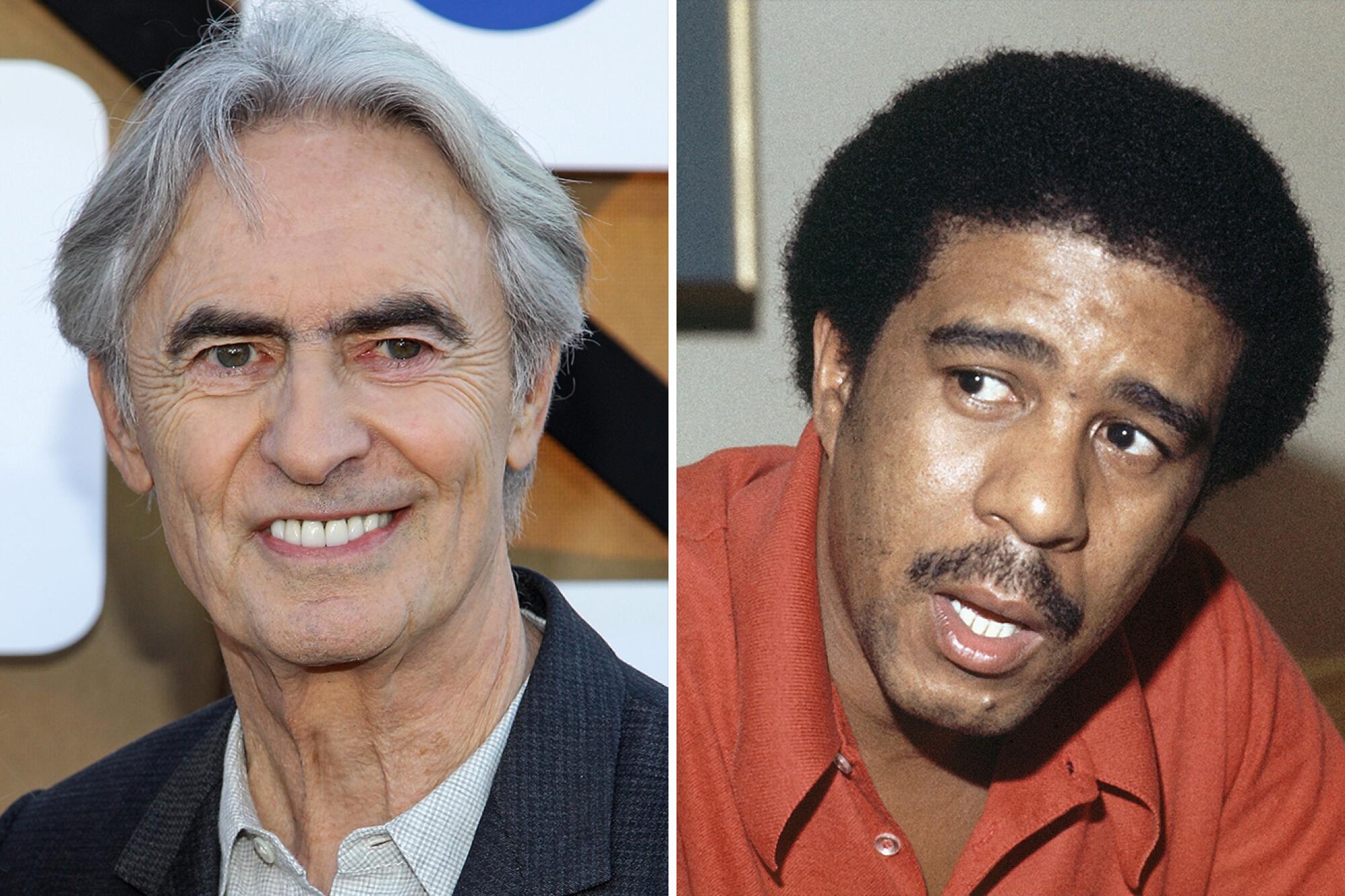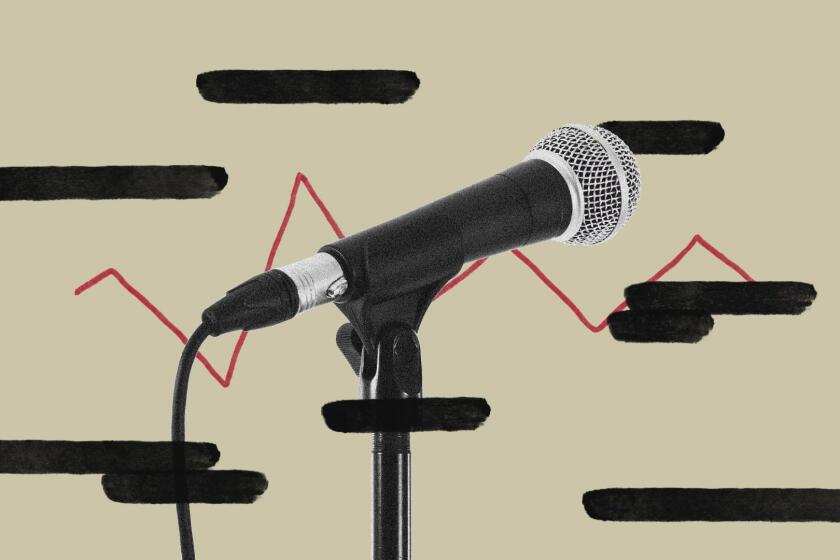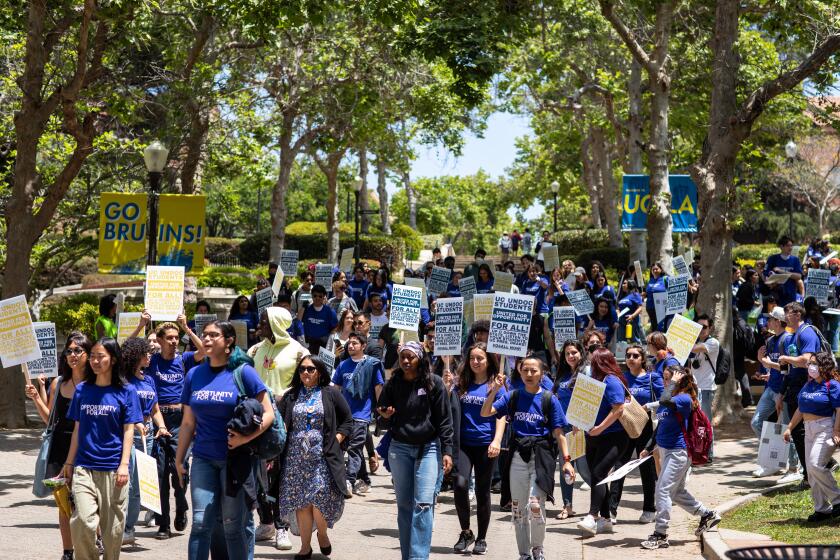
- Share via
The modern news cycle presents us with a new controversy every week. If social media is any indication, comedians, actors, musicians and filmmakers are continually under attack. We are engaged in a battle for the soul of the nation. Free speech is dying. The country is polarized like never before.
These are common beliefs. But do they hold up to scrutiny?
In the old days of newspapers, one could read disturbing articles and horrific headlines — but readers looked at them once and threw them away. Today, with social media, we scroll through the same horrific headlines over and over again, reinforcing a perception of catastrophe. There are awful things happening in America to be sure, but a good deal of what we are exposed to is intentionally composed to incite or manipulate the reader, placing it in the category of “culture war.”
Comedy historian Kliph Nesteroff and comics Donnell Rawlings and Tiffany Haddish explain the origins of modern-day cancel culture and its historical equivalents.
The culture war can be defined by a simplistic philosophy: “We are good. They are evil.” The term “they” is left intentionally vague, a convenient placeholder for whoever needs to be demonized at any given time.
Historian Richard Hofstadter described the philosophy in his 1965 book, “The Paranoid Style in American Politics”: “The central image is that of a vast and sinister conspiracy, a gigantic and yet subtle machinery of influence set in motion to undermine and destroy a way of life ... and what is felt to be needed [is] an all-out crusade.”
Show business has often been dragged into this war and used as a scapegoat. Jazz music, rock music, hip-hop. The tango, the jitterbug, the twist. Radio comedy, stand-up comedy, television comedy. All have been blamed for the downfall of America at one time or another — and all have been subject to censorship as a result. The end is near, we are warned, unless we do something to stop the madness right now.
The modern culture war was largely crafted by Paul Weyrich, a political strategist who exploited hysteria for political purposes. Weyrich was a lecturer for the John Birch Society’s speaking circuit in the early 1960s. The John Birch Society was founded in 1958 by Junior Mints manufacturer Robert Welch with other businessmen, including Fred C. Koch, father of the Koch brothers. They accused Dr. Martin Luther King Jr. of belonging to a Soviet conspiracy and warned that the Civil Rights Act of 1964 would lead to tyranny.
Performers today have more freedom of speech than before, not less.
Throughout the 1960s, the John Birch Society was mocked by showbiz personalities such as George Carlin and Bob Dylan. Weyrich realized it had become a laughingstock and distanced himself from the organization. But he retained its political philosophy, establishing the Heritage Foundation, the American Legislative Executive Council, the Council for National Policy and the Moral Majority. All of these organizations devised bogeymen to spread panic and hysteria, and all invoked terms such as “freedom” and “liberty” while advocating for greater censorship.
Comedy has now been drafted into this culture war with a common talking point: You can’t joke about anything anymore. And who is to blame? “They” are. Most recently “they” has referred to nondescript liberals, millennials and college students. And what is the proof that “you can’t joke about anything anymore”? A new taboo on certain slurs and behaviors perceived as bigoted — a far cry from being disallowed to say anything.
Today’s college campus has been cast as a villain in this culture war, characterized as anti-speech and pro-censorship. Descendants of the John Birch Society such as the Bradley Foundation and the Charles Koch Foundation have provided financial backing to establish conservative student groups on campus, which in turn invite provocative speakers, many funded by the same foundations. When the provocative speakers present views perceived as bigoted, a predictable response of anti-bigotry protest erupts and is used by these foundations as evidence that the campus is hostile to free speech.
Opinion: College students were ‘woke’ in the 60s and annoying to their elders. Meet their successors
When conservatives denounce campus progressives and radicals as out-of-touch elites, when liberals bemoan failures to defend free speech, and when both denounce cancel culture, we can hear the echoes of the 1960s.
These examples are then amplified and repeated through social media, podcasts, cable news and talk radio platforms, many of which are, again, supported by the same foundations. This echo chamber often frames the controversy as “free speech versus censorship,” when in reality, protest is itself a form of free expression. Rather than free speech versus anti-speech, most campus controversies consist of two opposing viewpoints pushing against each other — free expression versus free expression.
Despite what we are frequently told, comedy in particular has far more freedom of speech today than at any previous time in American history. For most of the 20th century, comedy about politics, religion or sexuality was forbidden, and a comedian who swore onstage risked jail time. As late as 1974, Richard Pryor was arrested for “disorderly conduct” simply for cussing in his stand-up act.
The relentless complaints found on social media are used as evidence that “you can’t joke about anything anymore” — but the same argument existed in the 1950s and ‘60s when most complaints came through the mail.
Before the internet, hostile grievances were published as “letters to the editor” in magazines and newspapers. An editor would choose perhaps one out of every 100 complaints for publication. Social media has removed the editor from the equation and hostility is published automatically. It gives the impression that people are more irrational, humorless and sensitive than in the past. But the vitriol found in those letters is very similar to today’s social media.
During its 1968-69 season, “The Smothers Brothers Comedy Hour” featured comedian David Steinberg delivering mock sermons in front of a stained-glass backdrop. As Robert Metz reported in his history of the network, a CBS executive recalled: “The mail was overwhelmingly condemning and several letters mailed directly to the Smothers Brothers’ Hollywood offices contained razor blades.” Their program feels innocuous by today’s standards, but it was highly controversial at the time.
Even as new, modern taboos have emerged, far more have been shattered. Compare what can be said on satellite radio and podcasts today to the long-standing rules and restrictions imposed by AM and FM radio. Compare the freedom of expression permitted on most streaming services with the censorship restrictions imposed during all of network television’s existence. Today one can repeatedly hear a swear word in commercials, talk shows and on awards programs when it’s in reference to the popular sitcom “Schitt’s Creek” — a title that would have been an unthinkable scandal just 20 years ago.
“There’s no question there’s now more freedom of expression in comedy today,” says Ernest Chambers, an Emmy-winning comedy writer who produced “The Smothers Brothers Comedy Hour” for two seasons. “I mean, having been through the Smothers Brothers situation — what we could and could not say 50 years ago compared to now? It’s no comparison. People just don’t know their history.”
That’s precisely the way the advocates of the culture war like it.
Kliph Nesteroff is the author of “Outrageous: A History of Showbiz and the Culture Wars,” which will be out Tuesday, from which this essay is adapted.
More to Read
A cure for the common opinion
Get thought-provoking perspectives with our weekly newsletter.
You may occasionally receive promotional content from the Los Angeles Times.











